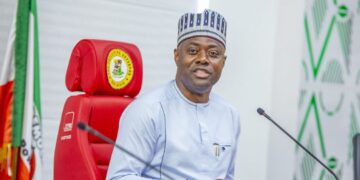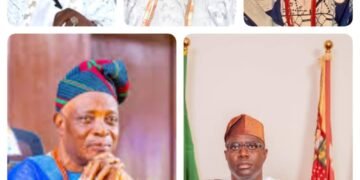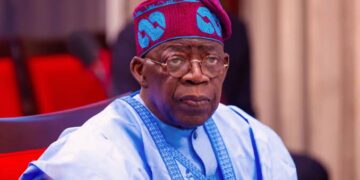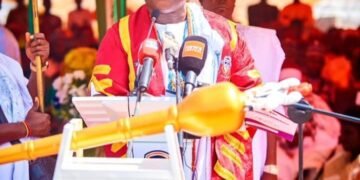Contemporary Nigerian politicians, particularly the so-called godfathers share many characteristics with African slave merchants who worked as collaborators with their European counterparts during the Trans-Atlantic slave trade. While the Atlantic Slave trade may have ended, neo-colonial slave trade is now coordinated by political slave merchants in Nigeria who have captured their people, enslaving them and cornering their collective patrimony and only return pittance to the enslaved. Like their pre-colonial mentors worked with outsiders to take their people across the Atlantic Ocean through the Door of No Return, Nigerian political slave merchants are working with the clergy in churches and mosques, monarchs, traditionalists, and communal godfathers to put their people in chains. But even if we were not part of those commodified at Vlekete slave market in Badagry, we are currently witnessing different dimensions of slave trading under what I have called ‘demoslavery’. ‘Demoslavery’ (demonstration of slavery) is a system in which the people are manipulated, duped, coerced and killed by ethnic political merchants to enthrone themselves and set their people on the journey of no return of underdevelopment and penury. Under ‘demoslavery’, provision of water, health, security, good roads and power have entered a symbolic ‘door of no return’ as making these a reality has been delivered in falsehood even under the messiah of Daura.
The victimisation experiences suffered by Nigerians during the slave trade era was observed, imagined and re-narrated to research students of Diaspora and Transnational Studies of the University of Ibadan. Significantly, there were 25 historic Diasporans who came from Maryland in the United States of America to reconnect with their root at the 2018 edition of the annual Badagry Diaspora Festival put together by the Door of Return Initiative (DRIN) headed by the Senior Special Assistant to the President on foreign affairs and Diaspora, Honourable Abike Dabiri and Vice Chair, Mr Babatunde Mesewaku. Dr David Anderson, leader of the delegation had lamented the split image experience of African-Americans in the USA. With hyphenated status, he noted that they were neither here nor there and suffers discrimination and differentiated citizenship. The 25-man delegation literally went through the Journey of No Return experienced by Africans captured as slaves and was welcomed back through the symbolic Door of Return (DOR). By experiencing the wickedness of slave traders and their African/Nigerian collaborators, some members of the delegation could not hold back tears. They got Nigerian names and chieftaincy titles from the Akran of Badagry and promised to facilitate development.
I dare say that only the trans Atlantic slave trade ended, post-colonial African and Nigerian experiences have reproduced and continue to manifest political slave merchants who continue to trade with the destinies of their people either with external collaborators such as IMF and neo-liberal financial institutions and agencies or home-grown political godfathers who use their people from the six geo-political zones to trade to enrich themselves while their people suffer like the Seriki Williams Abass of Badagry who commodified his people yet was part of the aristocracy in Badagry. Seriki Abass exchanged human beings with Mirrors and Umbrellas, built a Baracoon where fellow Nigerian slaves were chained and shed sorrowful tears and the women raped and hot iron used to press their breasts to designate slaves reserved for French, English and Dutch ships.
Fast forward to the 21st century Nigeria, we are free but everywhere in chains. Modern day Badagry; like other parts of Nigeria, bear prints of terrible experiences during the slave trade. Underdevelopment is a moderate way to describe the ruins found in that area of Lagos state that one often wonders if modern political godfathers in Lagos consider that part in their skewed development agenda. The ‘demoslavery’ construction of Lagos is Eko o ni baje (Lagos will not be ruined), implicating that development shall be skewed to only the area called Lagos and not other parts.
Despite Nigeria’s present poor ratings in fighting corruption, checking insurgency, terrorism, unemployment, health, education and poverty; political slave merchants with their collaborators are repositioning themselves on how to consolidate new forms of capturing narratives. Rather than witnessing positive changes at the individual, group, communal and state levels, what we have ranges from stagnation to retrogression. But the lives of the political slave merchants continue to witness positive changes. They jet abroad to treat themselves and visit their children in school while stifling funds to our health and educational institutions. While failing to declare emergency in education as promised in April 2018, the deceitful political slave merchants whose governments at all levels allocated about seven percent to education now plans to re-enslave the people by claiming to direct states to allocate fifteen percent to Education with another promise to declare a state of emergency!
While the 25 African-Americans were welcomed through the symbolic Door of Return, the political slave merchants in Nigeria have also opened their door of return from either the leaking umbrella to the lying broom party. The market of return is a flourishing market in which political slave traders switch camps with a master plan to continue to keep their people in bondage. In their lips, they use the masses to negotiate. At the zonal level, their godfathers shout about marginalisation of their zones instead of telling the truth that it is their self-marginalisation. Their people are traded off for self aggrandisement. They mortgage the future of their people while building mansions everywhere. It is fine if the corrupt works with their party but unacceptable if they are located in enemy camp. The mission of exploiters and their world are same: they deploy different enslaving strategies to keep Nigerians in their slave camps. That is why they just realised, after more than three years of allocating seven percent to education in national budget that states should allocate up to fifteen percent to education. Elections are around and the slave merchant antics have begun.
The 19 years of demoslavery (as against democracy) sustains the slave trade of Nigerian political slave merchants who have kept Nigeria and Nigerians underdeveloped through unrealised promises. With our seeming rootedness in demoslavery, are we not Journeying through the Door of no Return like in the trans-Atlantic slave era? Is it possible that 2019 holds greater promise of reclaiming Nigeria and receiving genuine change agents through the Door of Return to development as pathway to ending this modern day demoslavery? To realise this return to development, we must demystify political slave merchants who are strategically positioned in all ethnic groups and resist the narration of God makes leaders preached in churches and mosques as they are collaborators of contemporary enslavement of Nigeria. Kings who receive cars and road contracts without executing them but pocket the money are also associate slave merchants.
They are harbingers of underdevelopment but get their families fixed in political positions. As ending slave trade took resistance, the Nigerian voter in 2019 must reclaim Nigeria from hopelessness implicated in our current journey through the door of no return through a protest but conscious vote that will dethrone associates of modern slave trade in Nigeria, break the chains of political slave merchants and set us free.
Dr Tade, a sociologist sent this piece via dotad2003@yahoo.com












